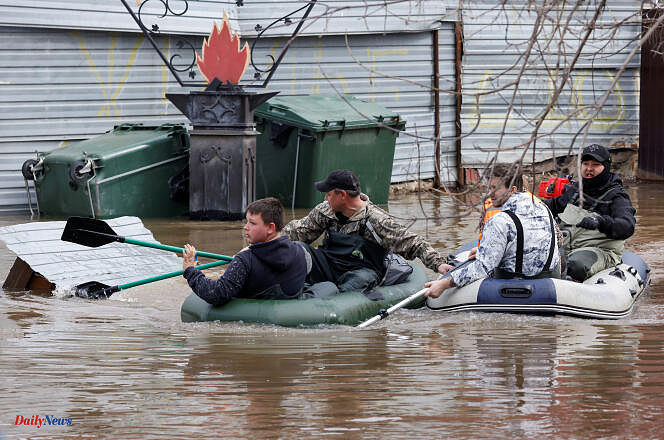The peak of the flood has not yet been reached, but the situation was already “very, very tense”, according to the Kremlin, Wednesday April 10, in several districts of the Urals and Western Siberia affected by the most serious floods for decades, just like Kazakhstan. More than 100,000 residents have been evacuated in recent days, mainly in Kazakhstan and Russia, the respective authorities announced.
These floods are caused by heavy rains associated with rising temperatures, increased snowmelt and the breakup of winter ice covering rivers and rivers. No link has been established with climate change, but scientists say global warming is favoring extreme weather events such as heavy precipitation causing flooding.
“The situation is very, very tense,” admitted the spokesperson for the Russian presidency, Dmitry Peskov, when interviewed by the press. “The forecast is unfavorable. The water continues to rise,” he said, adding that “large amounts of water are arriving” in the Kurgan and Tyumen districts. Despite this exceptional situation, Russian President Vladimir Putin does not plan to visit the disaster areas, said Mr. Peskov, in response to a recurring question since the weekend. After the attack on the Crocus City Hall near Moscow, which cost the lives of more than 140 people, the head of the Kremlin did not go to the scene either.
Nearly 13,000 homes flooded in the Orenburg region
In Orenburg, in the Urals, the water level reached 10 meters on Wednesday, according to regional authorities, well above the “critical threshold”, set at 9.3 meters. The record of 9.46 meters dates back to 1942. According to forecasts by the city's meteorological experts, the water, which has increased by 81 centimeters in the last twenty-four hours, is expected to continue to rise and rise again during the day. Authorities reiterated their calls for people in the flood zone “to leave their homes urgently.”
In total in the Orenburg region, nearly 13,000 homes were flooded, and more than 7,700 people evacuated, according to regional authorities. The only good news at this stage is that in Orsk, the oblast's second city, where a dike broke at the end of last week under water pressure, the level of the Urals fell by 29 centimeters, congratulated the town hall.
However, images released by the Ministry of Emergency Situations still showed streets covered in brown water. On Monday, residents gathered to demand accountability from the authorities, despite threats from the regional prosecutor's office against any illegal demonstration and while gatherings are strictly regulated in Russia.
The region of Kurgan, further east, evacuated “as a preventive measure” 1,600 people, including 280 children, emergency services said, and that of Tyumen, in western Siberia, said it was expecting record levels soon.
New floods expected in Kazakhstan
If Russia is strongly affected, the vast majority of evacuations have taken place over the last two weeks in Kazakhstan, in the west and north of the country, bordering Russian territory. “Since the floods began, 96,472 people have been rescued and evacuated, including 31,640 children,” the Kazakh Emergency Situations Ministry announced in a new report. It is the Kazakh city of Petropavlovsk, neighboring the Russian regions of Kurgan and Tyumen, which is most threatened. Around 200,000 people live there.
In total, more than 24,000 members of the ministries of emergency situations, interior, defense and secret services are taking part in the rescue operations, as well as thousands of civilian volunteers. Meteorological authorities have also warned that melting snow in the mountains could lead to further flooding in the east and south of the country.
In recent days, Kazakh President Kassym-Jomart Tokayev has publicly deplored the lack of preparation of local authorities, calling these floods "perhaps the greatest natural disaster, in scale and consequences, of these eighty last years ". The national anti-corruption agency announced on Wednesday that it was carrying out checks on special funds allocated to fighting floods, with embezzlement remaining endemic in Central Asia.












